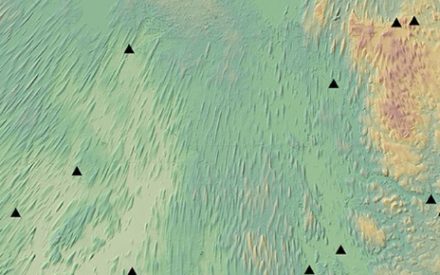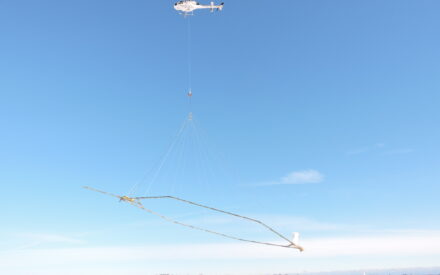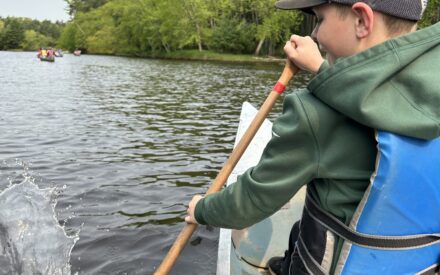Water is a shared resource and is depended on by Wisconsinites for a variety of daily needs including drinking, power generation, growing food, and more. However, agriculture is the dominant land use in Wisconsin, and current farming practices have a significant impact on soil and nutrients loss to surface and groundwater.
The majority of water bodies included on Wisconsin’s Impaired Waters List are a result of excess phosphorus creating eutrophic conditions, and many are located in predominately agricultural watersheds. Groundwater pollution from agriculture also presents a challenge. Nitrate loads to groundwater have increased statewide since 2013, and awareness of nitrate levels in private wells above the health standard of 10 parts per million (ppm) has increased the focus on nitrogen losses from agriculture practices. Discovery Farms water quality data indicate that conservation practices including waterways, no till farming, and cover crops can substantially reduce soil loss, but a better understanding of the dynamics of phosphorus and nitrogen loss is needed. Subtleties of phosphorus and nitrogen dynamics and the effectiveness of suggested practices are a key focus for educational content by Extension’s Agriculture Water Quality Program (AWQP).
The AWQP aims to increase the awareness of farmers, crop advisors, and conservation professionals of farming practices’ impact on soil and nutrient losses to surface and groundwater. Farmer adoption of conservation and water quality protection practices can depend on things like access to information sources, positive attitudes towards conservation, recognition of co-benefits, history of practice adoption, and trusted information sources. Program activities provide research-based conservation and water quality information through a variety of educational channels to increase the farmer adoption of practices that reduce losses of soil and nutrients to surface and groundwater in the long term.
Providing Research & Solutions
The AQWP delivered several different educational efforts to increase farmers, crop advisors, and conservation professionals’ awareness of f farming practices’ impact on soil and nutrient losses to surface and groundwater. Increasing awareness and knowledge of the dynamics of soil and nutrient losses in different farming systems allow for implementation of agricultural practices that are protective of water quality.
Discovery Farms collected water quality data from nine edge-of-field surface runoff sites and three subsoil leaching locations in 2023. This adds to the large existing database of water quality results that includes over 30 farms and more than 200 site years. Discovery Farms’ water quality monitoring and similar research by faculty in Wisconsin and beyond provide a basis for outreach information and practice recommendations delivered by Agriculture Water Quality Outreach Specialists.
In January and February, outreach specialists collaborated to produce a three-part webinar series to increase understanding of phosphorus loss based on time of year and farming system, and quantification of nitrogen movement in different locations and farming systems. Attendance at the three webinars averaged 160 viewers per webinar, with a mixed audience of farmers, crop advisors and conservation professionals.
In July, program staff partnered with Professional Dairy Producers of Wisconsin to host a Water Tour. The tour had 30 participants including agency personnel, farmers, and a variety of industry and elected local officials. The bus trip traveled to three diverse locations to look at technologies and current practices designed to help protect water quality and engage in discussions with water quality stakeholders and resource professionals.
In December, program staff partnered with colleagues from Crops and Soils, Nutrient and Pest Management, and Natural Resources Educators to host the Wisconsin Water and Soil Health Conference (WWASH). Over 350 people attended the first-annual conference, 28 partners served as sponsors or as part of the advisory and planning committee, and more than 20 UW–Madison and Extension colleagues collaborated to make the event successful. Just over 30% of the audience classified themselves as farmers, 50% identified as agency personnel, and 16% were crop consultants. While 16% of the audience had attended these events for five or more years, 45% had never attended a conference like this before. Farmer attendees represented the diversity of Wisconsin farming systems including 35% dairy, 72% cash grain, 47% beef, 12% vegetable and 9% organic (participants could choose more than one answer on the survey). Topics covered at the conference included cover crops management, impact of conservation practices on water quality, weed control using cover crops, ecosystem services of conservation practices, and equipment set up for conservation tillage systems.
Better Water Quality
For the farmers that attended these events, they gained information they can use to make daily decisions and new strategies to help implement agricultural practices that are protective of their local waterways. For the attendees that are not farmers, many are farm advisors, and they use this information to provide recommendations and technical assistance to farmers and landowners. In January, after attending a webinar, participants were asked about their increase in understanding related to each of the topics presented. For each webinar, over 90% of respondents reported a change in knowledge on the topics including nitrate leaching, and dissolved phosphorus, and 10-20% reported a significant change.
In July, over 90% of participants on the bus tour reported a change in knowledge, especially related to manure digestion technology and partnerships related to shared values of water quality. In December, the WWASH Conference asked participants about their change in understanding and ability to adopt management practices that support water quality based on conference attendance; 97% of attendees reported that they plan to implement or work with clients to implement strategies learned at the conference. Regarding knowledge change, participants were asked before and after the conference about several topics that were included in conference content. Overall, participants reported an increase in understanding as reflected by answers collected during a pre- and post-conference survey. The most significant barriers that are still present for many conference participants are cost, time, and equipment required to implement suggested practices. About 25% of participants also identified concerns about reduced yield as a barrier to implementation of cover crops, conservation practices, and practices protective of water quality. Survey data from all these events helps us to understand what challenges we should address and to tailor future educational offerings to meet the needs of audience members.
Download Article

 An Improved Geologic Map of Wisconsin
An Improved Geologic Map of Wisconsin Depth-to-Bedrock: Updated Mapping & Decision-Making
Depth-to-Bedrock: Updated Mapping & Decision-Making Building High-Quality Programs to Help Youth Thrive
Building High-Quality Programs to Help Youth Thrive Nature’s Navigators: Supporting Neurodiverse Learners
Nature’s Navigators: Supporting Neurodiverse Learners


